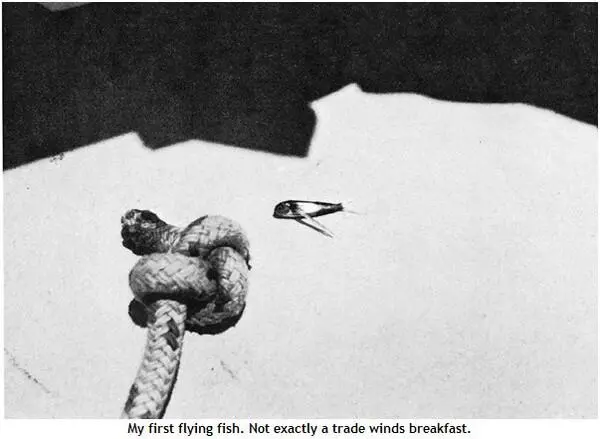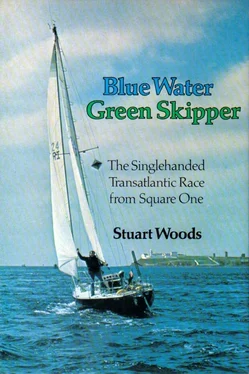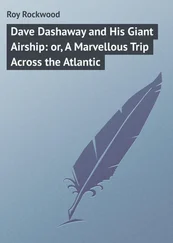
A day later, the water situation was still on my mind when I rose to find Faial, green and lovely, off my port bow, with a cloud-enshrouded Pico behind. The height of the islands, Faial at 3,500 feet and Pico at 7,000 feet, must make them among the best landfalls in the world, when they are not obscured by cloud. I thought of Horta and the people and places I knew there — Augie and Luis, the Club Naval, Peter and his Café Sport, the Estalagem and the village market — and I resolved to come back when I could combine the excitement of seeing the Azores with the satisfaction of visiting them.
The BBC was now reporting that the race winner was five hundred miles from Newport, but they had stopped mentioning Tabarly specifically. I wondered how Mike McMullen was doing, hoped he was up front, unnoticed and winning. I had thought about Lizzie and Mike often, and I wanted him to be not just the first multihull but the first boat across the line. I knew that no one else could be as highly motivated.
The water was choppy in the archipelago waters. Faial remained in view for nearly a day and a half in the clear weather, and as I was coming on deck for my noon sight on the twenty-fourth, glancing to see if the island was still there, I saw instead a ship coming up fast astern of us. She was Olwen, Royal Navy, I think, since her officers were in whites, but there were women aboard, too, and I wondered how the Royal Navy had managed that. She passed me, then circled and came close abeam my starboard side, and I shouted through my Tannoy loud-hailer, “Please report me to Lloyds.”
“I have already done so,” replied an officer from the bridge.
I asked for my position, but he was unable to get the information before his part of the ship passed me, and suddenly Harp was very close to her, close enough for a rating further aft to ask after my welfare only barely raising his voice. I dropped everything and threw in a very fast tack, and the big ship slid by only a few yards away. That rattled me a bit, and it must have got to her captain, too, for this time he did not circle but hove to and waited for me to come to him. I was not about to go anywhere near the ship, stopped or not, without an engine. He waited for a few minutes, probably trying to get me on the VHF, because an antenna was visible at my masthead, then sailed on. At least my position would be reported, I thought.
That night I heard on the BBC that Clare Francis was a thousand miles from Newport, apparently on the great circle route. I got out the dividers and measured my distance from the finish. I had made my first turn on my course at about 37°30′N, 35°W, and I still had just over two thousand miles to go. Maybe they were having heavy weather up there, but at least they were having wind, too, while I sat becalmed or in light headwinds day after day. But now I was at my southerly turning point, the place where the reaching winds were supposed to be. If they came, and if they were fresh, my daily runs would improve dramatically. And anyway, didn’t they have calms on the great circle route? Maybe there was a chance of making a good showing, yet.
I don’t suppose I had really expected fresh reaching winds to materialize the moment I reached a point on the chart, but I was bloody disappointed when they didn’t. Still, at the end of three weeks I had covered 1,645 miles over the ground, and my daily average was improving steadily.
Life went on in a regular sort of way, my daily routine continuing. I saw my first sea turtle; he measured about three feet across his shell and was covered in barnacles. We sailed slowly past him in light winds, so slowly that I was able to go below, get a camera, and take a couple of shots of him.
Then my eggs went bad. An egg company had given us thirty each, and Yves Anrys had given me his, but for some reason my taste for them had disappeared and I had eaten only two since Plymouth. I had a good time with them now, though. I sat in the cockpit and dropped them overboard one by one, watching as they sank but remained in sight for an amazingly long time in the clear water.
I had passed my halfway point and had begun to get out my large-scale charts of the east coast of the United States and mark them up for future use.
On July 28 the BBC reported that the French Navy had started a search for Eric Tabarly. This seemed ridiculous to me, since he had been out for only twenty-two days, and there were any number of good reasons why he might not have appeared in Newport yet. What seemed more a cause for concern was that sixty-seven of the yachts in the race had not been sighted or heard from either during the past week or since the start. I was glad I was not one of them. It suddenly occurred to me that although I had been seen and my family and friends had news of me, I had none of them and would have none until reaching Newport.
Anything might have happened — someone might be dead or ill — and I would have no way of knowing. It was a facet of single-handing that had never crossed my mind and I found it mildly discomforting. Colas was reported two hundred miles from Newport after putting into St. John’s, Newfoundland, for repairs. This was perfectly proper, since the rules stipulated that a yacht could stop anywhere for as long as her skipper wished, as long as he was not towed for more than two miles into and out of port and observed all the other rules.
The following day, the twenty-ninth, I heard that Tabarly had won, crossing the line at nine in the morning, Newport time. Colas was thought to be close behind. I was sorry that Mike McMullen hadn’t won, or Mike Kane, but there was still the multihull prize, which I had begun to think of as the “Tin Lizzie.” Then, the next day, came the amazing news that Michael Birch, in one of the little Newick trimarans, The Third Turtle, had finished third, followed closely by Kazimierz Jaworski in his thirty-eight-foot monohull, Spaniel. They were both remarkable performances, Spaniel ’s being perhaps the most remarkable, since she was a monohull. David Palmer, who had expected to win the Jester class in FT, had dismissed the Newick trio as contenders, saying that a boat completed this season could not win for lack of time to prepare. It was a classic case of a competitor believing that everyone else would experience the same teething problems he had; of not recognizing that there will always be someone, in a race of this size, whose boat is better designed, better prepared, and better sailed than yours. Considering all the variables, it was not a race to be cocky about. Here we had the boat that everyone had predicted would win in a walk coming second, beaten by a boat designed to be sailed by fifteen men, then two yachts from the smallest class finishing third and fourth, ahead of much larger, faster boats which should have beaten them. It was that kind of race.
From my log of July 1: I have just dined on sweet and sour ham, with peanuts and raisins, and the Bâtard-Montrachet ’70 and am a little bit drunk; Willis Conover is playing very good jazz on the Voice of America and Mike Flanagan is dead. BBC said at midday, as I was eating a ham sandwich, that Galloping Gael has been found by a merchant ship, drifting, with no one aboard. Mike is apparently the victim of what I have always thought is the single most dangerous risk of this Race — falling overboard and watching your boat sail away. It is said that drowning is a pleasant death, but it cannot be pleasant to tread water and contemplate it until it happens. When I heard about this my first action was to put down my sandwich, go and sit on the back porch (first clipping my harness to the pulpit) and rig a tripping line to the self-steering. It is now being towed behind with a number of knots and two loops tied into it. It may not be much, but it is all I can do. I didn’t know Mike Flanagan well, but he seemed a nice enough fellow and was, I am told, supremely confident of his chances of winning the “Jester Trophy.” Now, barring a true miracle, he is gone, a victim of what? The Race? His own self-confidence (vanity)? Or an unavoidable accident? (There are unavoidable accidents.) Now, in the last month, two attractive young people I knew are dead. Why do I feel responsible, or at least guilty? They are not dead because they both knew me, although I may have been their only connection. I have believed from the beginning that someone would die in this Race. Now, someone has. God, let that be an end to it.
Читать дальше













